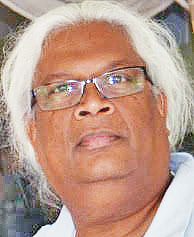Opinions
Nearing the edge

The latest fires scouring the Napa Valley have created a surreal scenario that in places looks as if some giant had scooped up large houses and devoured them, like ice cream.
Perhaps builder Trump will triumphantly show his business and theatrical skills, and restore them all to their former glory, with a flick of his wand. But the Brothers Grimm passed on a long time ago, and as far as I know, Trump is not a descendant, but who knows? His paternal ancestry (Kallstadt, Germany) is not too far from Grimm’s, and the same as that other magician, Henry Heinz (57 varieties), and not so far away from Hitler’s birthplace in Austria, and his later retreat in Bavaria.
Certainly, Trump has a grim intent, as the Puerto Ricans keep saying, while others remind him of his oath to protect every American citizen. I suspect, though, that he doesn’t think of Puerto Ricans as red-blooded Americans: wrong language; wrong politics; wrong race; wrong colour!
I have no doubt that most of Puerto Rico’s 3.4 million people are thinking of moving to the mainland, and would have done so, were they connected by land.
It’s been more than three weeks since Hurricane Maria slammed the island, and most of it is still without power. House Speaker Paul Ryan visited and reassured the people of support from Congress, saying “we are all in this with each other for the long-haul.” But the President’s half-heartedness is more in line with his general xenophobia, and such extremes as anti-Islamism, antipathy for non-whites, an attitude of rejection for coloured and minority citizens, forsaking refugees, who as a result crowd Canadian borders.
He allegedly supports white supremacists, placing non-white nationals, of any generation, at risk of assault or even death from rightist activists, such as resulted from the French bathing suit law. Increasing attacks by law officers occur on innocent civilians, without criticism.
As an ideology, white nationalism is a worse threat to Western democracies than Islamic jihadists; its proponents and sympathisers have proven, historically and recently, that they can win or perform well at elections, e.g., Enoch Powell in Britain not so long ago, and recently in France, Germany and the Netherlands; now they control the most powerful and destructive position on the globe. This is leading us back to the crusades, the last one sadly, now that nuclear power can be deployed.
But while white western extremists hurl insults and bullets at black, brown and non-conformist targets, society has to find ways to supply labour and regenerate the race; dwindling fertility and preference for life indulgences over procreation will not make babies, as Japan has discovered. What can whitists do? Some here propose that robots will supply western labour needs, but at this time, they will only perform repetitive and mechanical tasks, not those requiring flexible judgement and emotional feeling.
In the past, Hitler gave subsidies to multiparous women; Wahhabist Muslims encourage overbreeding through multiple wives, and ISIS has openly recruited women in the west for procreation, “to breed soldiers”. In India, Muslims court “jihad brides” among Hindu girls, openly. The population of Muslims has increased to 14% from 10% in the last 50 years. The fear of a rising non-white population is prevalent. France’s Marion LePen, who lost the presidency election recently, decried what US republicans call “anchor babies.”
Earlier, Trump had cancelled his resolve to deport over 600,000 people, who had come to the US as children and granted a 2-year amnesty by Obama under the DACA (Deferred Action for Childhood Arrivals) program. But he did end Obamacare subsidies to insurance companies, which will surely raise premiums, and deprive poor citizens yet again. But more dangerous is his threat to scrap the Iran nuclear agreement that involves other countries. Trump’s tug-o-war with N. Korea has escalated, with bombers probing Korean skies as if testing reaction and logistics. This is a childish game; Trump should leave N. Korea to Tillerson and diplomacy, not ignorant bluster. Overall, Trump’s conduct would have been a bizarre comedy, if he was removed from the Armageddon switch, and not facing-off against Mexico, Iran, North Korea, Venezuela, Russia, and untold others.
Time when just a bird tweeted
 Romeo Kaseram
Romeo Kaseram
My aged friend is sitting forward and upright in his chair the way the doctor told him to, so his backbone straightens out from its curvature. The knuckles on the hand are as knobbed as his walking cane. When he speaks, the wrinkles over his alert eyes, and under his chin, become animated, exaggerating the disapproval as he shakes his head over how our generation is dancing its way down the road to total annihilation.
He says, “When I was a boy, a tweet was something you heard from a bird. A picoplat!” he adds with a cackle of inspiration, a ray of light piercing through
the clouds hovering in his eyes, so I have to nod my head in recognition over the name of the finch. “Yes, a picoplat!” He repeats the name of the seedeater, smacking his thinning lips with glee, celebrating his recall triumphing over the calcification that age layers onto memories, recalling how he trapped and caged finches as a young boy back-home, and then chuckles privately, his eyes turning for a moment inward as he begins drawing to the surface the faraway days of his youth from that time when he is young and agile again, and striding on two strong, able legs, chased after the flittering, trembling songsters through seas of waist-high, undulating yellow grass.
But before he begins his trudge down memory lane on his two aged legs and a walking cane, he begins sliding carefully all the way back on the chair, levering with effort both knees and pushing back on the knobbed cane using his hands, coordinating all of himself in readiness for a long, rambling “Narration”, as he likes to call his stories of the old-time days.
Before he is done settling-in, his forefinger with its crooked tip, and the hint of yellow under the opaque fingernail, is waved to take illustrating swipes like a windshield wiper at our “modern times”, the action a warning as much as it is a clearing of the way ahead to a prognostication of how my generation is hurtling along with the entire planet to self-destruction.
He says, “Yes. In my day, a tweet came from a picoplat. I hear nowadays one tweet could start a world war. Imagine that! How irresponsible could a world leader be?”
He does not launch out on an all-out attack, saving this trump for later. Instead, my aged friend turns inwards. Yet in his narration, with his voice rising and dipping on the uneven road now bumpy with overlapping, disconnected memories, he is unable to make the connection that his world back then was just as turbulent, and similarly on the edge, as this modern-day one is for us, speaking as he does to the years when the World War in the 1940s was felt back-home, not in the brutality and its horrors at the centrality of its theatre in Europe, but in its quotidian deprivations when he was starving as a young man at the edge of the colonial stage.
He says, “Most of all, I remember the rationing. We lined up for hours outside the shops to get a pound of flour and a petit-quart bottle of cooking oil. Sugar was scarce despite we were grinding tons of canes and making it not far from where we lived, and outside the factory stood armed guards! We waited and waited, shading our eyes from the hot sun, the shopkeeper himself waiting behind the counter and slapping at the flies with his big hand. Thump! Thump! Everybody was on edge, constantly gazing down the road, listening for the government delivery truck grating its gears to climb over the hills among the cane fields. Once somebody said, ‘What if the Germans come with an airplane and bomb the delivery van?’ We were nervous, then somebody laughed and said we were unimportant, too far away for the Germans to drop a bomb on us.
“When the truck finally came, the shopkeeper always made sure to let us see how disappointed he was. He would put on a serious face by raising his eyebrows and shaking his head at every package the delivery man took inside the shop. This was to say how little the provisions were from the colonial government. But then the shopkeeper would laugh and slap the delivery man on the back, and give him a drink of white rum and water with us standing thirsty in the blazing sun. We all knew what was happening, but we were helpless. He closed the shop doors right away after the delivery van left. We could hear him putting on the iron-bar across both doors inside. What he was doing was putting aside the best, more than a fair share for his family before weighing and parceling the rations for us. Then we heard him removing the iron bars. When he opened the doors, all mayhem broke loose.”
He grows quiet, the memories too robust for weakening words. “But the picoplats!” he whispers. “Those tweets were sweet! And you were not afraid the world was coming to an end!”
